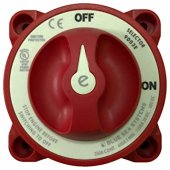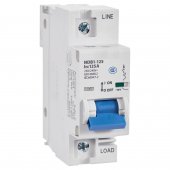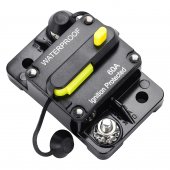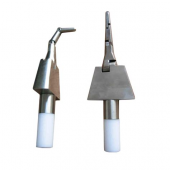再生可能 エネルギー
New Member
- Joined
- Nov 28, 2019
- Messages
- 261
I try to use the best 48 V Switch for my Solar System, to easily disconnect the 48 V battery, the SCC controller, and the DC/AC inverter.
I found various information, and I would like to find some recommendation to dictate my choice:
- I noticed that many systems use the typical Blue Sea marine battery switch:
- I noticed also this video from David Poz recommending using DC circuit breakers
- I noticed also some other type of switches:
The Blue Sea switch seems easy to install, because the switch already has a casing with four holes for screws.
But a 16 cells LiFeP04 battery might top off at about 60 V which could too high for this switch,
primarily designed for Lead acid batteries.

The DC Circuit breaker might be safer but requires an additional box with a DIN rail

The other type of breakers in general don't get good recommendation

- Beside the nominal voltage of 48 V, my Solar system will be design for producing about 5 kW,
so those switches will need to handle at least 100 A, but I don't really plan to use them under load.
So what recommendation would you have for a 48 V switch?
- Also I would like to install a pre-load resistance for connecting the DC/AC inverter to the battery.
Is there any swich providing a temporay position to always force using a preload resistance?
Or do you have any recommendation, like a push button, to connect a preload resistance.
I found various information, and I would like to find some recommendation to dictate my choice:
- I noticed that many systems use the typical Blue Sea marine battery switch:
- I noticed also this video from David Poz recommending using DC circuit breakers
- I noticed also some other type of switches:
The Blue Sea switch seems easy to install, because the switch already has a casing with four holes for screws.
But a 16 cells LiFeP04 battery might top off at about 60 V which could too high for this switch,
primarily designed for Lead acid batteries.

The DC Circuit breaker might be safer but requires an additional box with a DIN rail

The other type of breakers in general don't get good recommendation

- Beside the nominal voltage of 48 V, my Solar system will be design for producing about 5 kW,
so those switches will need to handle at least 100 A, but I don't really plan to use them under load.
So what recommendation would you have for a 48 V switch?
- Also I would like to install a pre-load resistance for connecting the DC/AC inverter to the battery.
Is there any swich providing a temporay position to always force using a preload resistance?
Or do you have any recommendation, like a push button, to connect a preload resistance.
Last edited:




